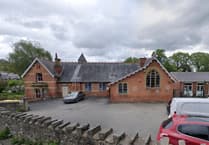A new poetry competition is hoping to inspire Welsh poets to tell the outside world what a special and important place mid Wales really is.
The majestic mountains of north Wales, magical Anglesey, the gritty industrial valleys and ports of the south Wales coast – these are well known to everyone within Wales and beyond.
The vast majority of Wales’ land area, however, lies north of Bannau Brycheiniog, west of Offa’s Dyke and south of Yr Eryri. It stretches from the wonderful rolling hills of Radnor Forest, the vast and tranquil uplands of the Cambrian Mountains with its lakes, rivers and reservoirs, to the stunning coastline of Ceredigion.
Yet this whole expanse is somehow overlooked in the popular imagination today despite cultural heritage going back not just centuries but millennia, to the first communities that mined Copa Hill and left cairns and megaliths marking travel routes across Wales and beyond.
Once visited, anyone looking for a break from the tail-chasing madness of modern life is bound to be forever smitten. Unsurprisingly, though, they tend to keep quiet about it. So too do the local communities, busy getting on with living and farming as their forebears did before them.
As a result, it can sometimes seem that nothing needs to be said beyond the dry official statistics of population –Powys being the least densely populated part of Wales, with the highest percentage of people over 65 and the lowest of under-15s in the 2021 Census. Ceredigion, in the same census, held the dubious distinction of the largest population fall.
Figures like these influence policymakers in their thinking and planning, without ever reflecting the true value of the people and the places. What would Wales be, without its rural towns and villages dotted among unspoilt open spaces and sun, wind and rain-swept hills?
Llywelyn ap Gruffydd and Owain Glyndŵr, the ancient Princes of Wales, knew these midlands intimately, criss-crossing them with armies and holding court in the brief peacetimes. The fire of the 18th century Methodist Revival was lit in Mid-Wales when inspiration first struck Howell Harris at Talgarth Church. It later focused around Daniel Rowlands’ preaching at Llangeithio and William Williams’ prayers through the night at Moriah Chapel Abergwesyn. Today’s leaders rarely if ever appear in mid Wales, showing no such respect or affection for the region.
A new poetry competition set up by the Cambrian Mountains Society hopes to bring some of this passion to bear on Welsh life in the 21st century.
Brian Davies, a fisherman and Welsh-language author born and brought up in the foothills of the Cambrian Mountains, who is a trustee of the society, said: “What better way could we have to celebrate the landscape, people and culture of this country than through its great tradition of bardic poetry and hymn writing?
“We wanted to remind people that the world they live in is not just about spending time looking at what other people post online and thinking what they want us to think, but looking about, feeling part of the nature and the communities on our doorstep.
“It’s well-known that time spent outdoors, and helping others, is the best way to mental health, while too much time online gets people down. Writing a poem is one of the best ways to sort out your own thoughts and feelings and get to understand what really matters – to you.”
TV naturalist Iolo Williams, president of the Cambrian Mountains Society, said: “The Cambrians are the last true wild area of Wales, one of the last places in our land where you can truly lose yourself in nature.”
It’s time to get your pencil sharpened and speak out about the unique quality and inheritance that mid Wales contributes to this country.
The competition, which is open to all, offers prizes of £150 for the best poem in English and the best poem in Welsh – to be judged by Eisteddfod-winning local poet Vernon Jones of Llandre – and there’s a separate prize of £100 for the best poem by an author living in Carmarthenshire, Ceredigion or Powys.
The closing date is 30 November.
Full details can be found on the Cambrian Mountains Society’s website at www.cambrian-mountains.co.uk/poetry



.png?width=209&height=140&crop=209:145,smart&quality=75)
